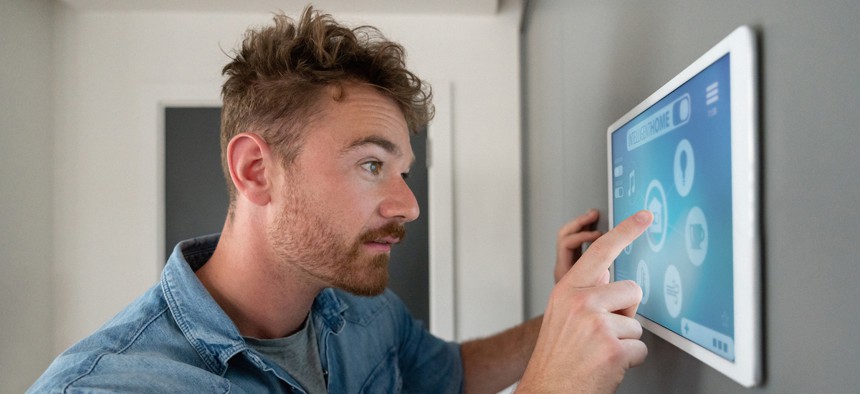Friendly competition heats up energy conservation among neighbors

andresr/Getty Images
Indiana saw a 30% reduction in residential energy use across four cities after deploying the MySmartE system that incentivizes households to conserve energy.
State and local governments are rolling out ambitious clean energy targets in a bid to slow the effects of climate change, but establishing goals is only part of the battle.
While officials can direct public sector building managers and utilities to comply with energy targets, getting residents to reduce their energy consumption is a separate challenge. A newly developed interactive software platform that gamifies home energy management, however, could help governments realize their energy efficiency goals.
The cloud-based MySmartE platform, developed by researchers at Purdue University, integrates a wall-mounted tablet, homeowners’ smart thermostats and an analysis app to track residents’ energy use behaviors, calculate and display an energy efficiency score and provide customized recommendations based on each household's energy consumption.
Based on their residents’ energy management decisions, households are assigned an efficiency score from zero to 100. A lower energy efficiency score is given to occupants who, for example, let the thermostat run on the same high setting, no matter the season or whether anyone is home. Users can compare their scores with their neighbors, which promotes energy conservation through a collaborative, community-level game.
.jpg)
For state and local governments, MySmartE can help measure the impact of energy efficiency programs and motivate residents to participate in energy conservation efforts, said lead researcher Panagiota Karava, a professor at Purdue’s Lyles School of Civil Engineering. “People want control over their [heating and cooling] devices at home,” she said, “but they might not be aware of the energy consequences of their actions.”
In 2022, for instance, the residential building sector accounted for 22% of the country’s energy consumption, with heating and cooling making up more than 50% of total energy use in homes. MySmartE offers residents a way to “optimize both their comfort and well-being while also accounting for energy efficiency and saving energy costs,” Karava said.
MySmartE-enabled tablets have been deployed in four Indiana cities—Indianapolis, Fort Wayne, New Albany and South Bend—since 2019, and data from 2021 to 2023 indicates household energy-reductions of 30% across 130 homes.
South Bend, for instance, has a goal to be carbon neutral by 2050, said Alexandro Bazán, director of the city’s Office of Sustainability. But to reach that target, officials had to consider more innovative strategies for decreasing energy-related emissions. Identifying and assisting homeowners who would benefit from a heat pump, for instance, is a heavy and costly lift for cash-strapped agencies in cities like South Bend that house more than 100,000 residents, he said.
MySmartE gives state and local governments wanting to reduce residential energy consumption a low-cost solution. Plus, it can help inform future programs as residents provide feedback, Bazán said.
What makes MySmartE effective is the social element, Karava said, meaning if a resident sees their neighbor implementing energy efficiency measures and getting a better score, then they may feel compelled to do the same.
The platform also displays the community’s average energy efficiency score, Karava said, which adds a social and even competitive aspect to the platform. As more residents implement energy saving actions, the community score increases, and high-scoring individuals can earn financial incentives for participating in the program. So far, the university has offered individuals small rewards, such as $25 to $50, for achieving the most energy efficiency during community games.
The software uses machine learning to analyze homes’ energy usage and deliver personalized recommendations that help residents minimize their consumption. A notification could suggest that the user configure their thermostat to adjust the temperature on a schedule that uses less energy, Karava said. Residents can use voice commands through home devices like Alexa to apply any tips the software recommends, making the tablet and software easy to use.
The platform offers an “opportunity to reduce energy consumption, reduce [residents’] energy bills and help the city achieve its goals,” Bazán said.
Purdue University partnered with the Indiana Housing and Community Development Authority and BWI, a real estate developer, to deploy the MySmartE program. The project has been funded through $4 million in grants from the National Science Foundation since 2018.
Researchers hope to patent and commercialize the product so it can be scaled up to a national model, Karava said.






